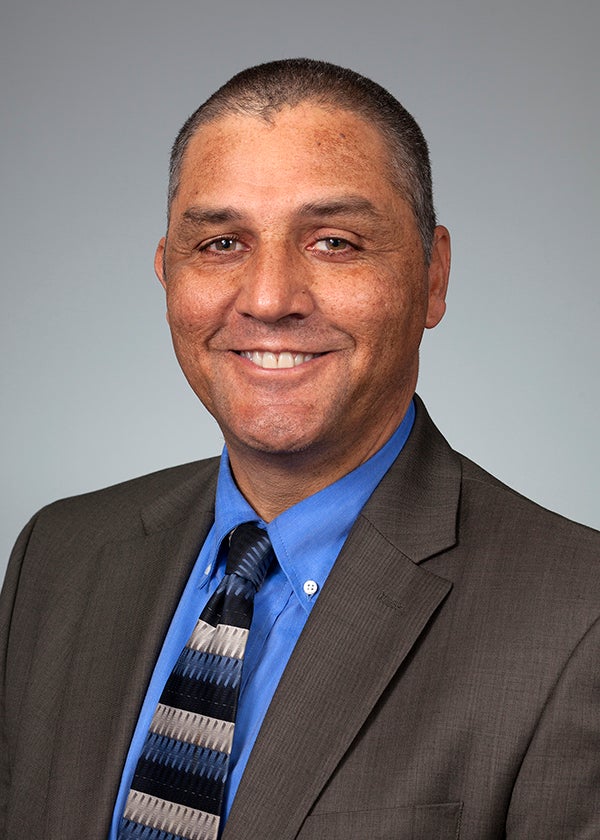Virtual health disparities roundtable features ECU public health experts
A virtual roundtable hosted by Laupus Library featured three East Carolina University public health experts who presented and answered questions about health disparities in eastern North Carolina.
The event, “Virtual Roundtable Discussion: Minority, Public, and Rural Health Disparities,” was held in mid-October and included panelists Dr. Ronny Bell, chair and professor in the Brody School of Medicine’s Department of Public Health; Dr. Eric Bailey, professor in public health and anthropology; and Dr. Karlene Cunningham, clinical assistant professor in Brody’s Department of Psychiatry and Behavioral Medicine.
Nearly 50 attendees joined the panelists via Microsoft Teams for dialogue, questions and information on how health disparities impact the well-being and quality of life for many people living in eastern North Carolina.
Bell opened the event with Martin Luther King Jr.’s words, “Of all the forms of inequality, injustice in health care is the most shocking and inhumane.”
That belief, Bell said, “speaks to the breadth of this issue” of health disparities—measurable differences or gaps seen in one group’s health status in relation to another group. Health inequities are “the unfair differences that prevent everyone from the opportunity to have good health,” he explained.
Bell illustrated how factors from education, housing and transportation to environment, access to healthy food, poverty and violence are drivers and determinants of health. He explained that those factors contribute to African Americans, native Americans and other minority being often hundreds of times more likely to be diagnosed with diseases from diabetes to HIV than others.

Dr. Ronny Bell, chair and professor in the Brody School of Medicine’s Department of Public Health (Contributed photos)
Bell gave an overview of his experience prioritizing goals for North Carolina’s health while serving on the task force that produced the N.C. Department of Health and Human Services’ report, “Healthy North Carolina 2030: A Path Toward Health.” That project was in conjunction with the North Carolina Institute of Medicine and was based on mapping out a plan to overcome health disparities that occur in social and economic contexts such as age, gender, physical environment, education and other drivers of health.
That report is an outline of “where we want to see those changes occur,” Bell said.

Dr. Karlene Cunningham,
clinical assistant professor in the Brody School of Medicine’s Department of Psychiatry and Behavioral Medicine

Dr. Eric Bailey, professor in public health and anthropology; former program director, Comprehensive Minority Biomedical Branch, National Cancer Institute
Cunningham discussed the mental health aspects of health disparities, including shortages of psychiatrists and other mental health care professionals, including minority providers.
“There are shortages of health care providers across our disciplines,” she said.
That shortfall can cause people from underserved populations who need that type of care not to pursue it.
“People often don’t see people who look like them, and that can definitely be very impactful,” Cunningham said, “and create barriers to people getting the help they need.”
Bailey shared how his experience for the National Institutes of Health gave him a new perspective on health disparities. He served as program director for the Comprehensive Minority Biomedical Branch at the National Cancer Institute.
“That really opened my eyes to health disparities on a national basis,” Bailey said.
While much of his work focus on minority health and improving health outcomes through public health and anthropology, he emphasized that health disparities impact all people and groups.
“Everyone is a part of a some type of health disparity,” he said. “When I share that with my students, they’re surprised.”
Panelists and attendees voiced interest in research potential and opportunities on topics related to health disparities. The panelists not only shared their expertise; they also shared about the efforts they share with their colleagues and departments in addressing the most prevalent health disparities and contributing factors for patients in the East.
The event was part of efforts through Laupus Library to facilitate interprofessional dialogue on topics of interest on the Health Sciences Campus.
“The library has the resources and expertise to manage discussions like this that are important to our campus and community,” said Beth Ketterman, director of Laupus Library. “We like to think of ourselves as connectors at Laupus, and bringing together campus researchers and thought leaders on health disparities topics is a way we connect our patrons with this expert knowledgebase we have in the Division of Health Sciences.”